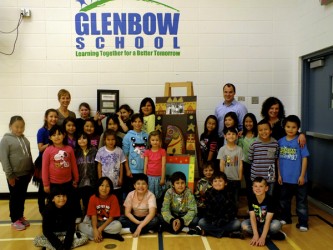Article Origin
Volume
Issue
Year
First Nations and Métis Grades 1-4 students from Glenbow School in Cochrane were awarded for their community-focus in selling cards to raise money for the Nakoda Food Bank.
Warrior Paint: painting to fight hunger
First Nations and Métis Grades 1-4 students from Glenbow School in Cochrane are taking their community involvement a step further. After being recognized with a national award for their efforts in raising funds for the nearby Iyahrhe Nakoda Food Bank Society, the students are setting their sights on helping victims of the devastating flood. “The funds raised from the cards will be even more important with the recent flood. We are hoping to pair with a resource company on the reserve to match the monies raised,” said teacher Sherri Rinkel Mackay. The students created group paintings using historical photographs of their ancestors. With mentorship the students created a business plan and marketing strategies for selling the greeting cards they created from the group paintings. All proceeds went to the food bank at the nearby First Nation. In recognition for their efforts, the students received a National Award for Innovation in the “Impact on Community” category. Along with the award they received a $500 cash prize which they also donated to the food bank. The award is sponsored by The Learning Partnership, a non-profit organization that brings together business, education, government, labour policy makers and the community in partnerships to strengthen public education in Canada. BMO/Nesbitt-Burns support the “Entrepreneurial Adventure,” program in which the students participated.
Enbridge supports education in Aboriginal communities
Although Calgary-based Enbridge Pipelines Inc. has achieved silver level in the Canadian Council for Aboriginal Business Plus membership for improving partnerships using the progressive Aboriginal relations program, senior executives believe the company can do much more. Lyle Neis, Enbridge’s director of Aboriginal and stakeholder relations, says the high standards are maintained by employees, the Aboriginal community and business partners. Enbridge is striving for gold level status in 2015. “Enbridge is the first pipeline to receive certification of any kind and as a result has set a direction for further improvements by us,” said Neis. “Our goal is to reach gold level status in 2015, but we have a lot of work to do in order to achieve that.” Enbridge’s extensive work with Aboriginal communities includes supporting community investment initiatives, skills development, and education and scholarship programs. Neis says Enbridge is seeking new ways to continue to improve relations with Aboriginal communities and will expand its focus on education. Since 2009, Enbridge has worked with the Assembly of First Nations to enrich programming in more than 70 schools in communities near its pipeline routes and its Ontario wind farm. More than 10,000 Aboriginal students have benefited from over $3-million provided to enhance programs that have encouraged them to stay in school. “We are making a difference with the Aboriginal business community across Canada. Last year alone our companies generated $89-million in employment and business opportunities for Aboriginal communities that are located near our projects and operations,” Neis said.
Renewing our relationship with the land
Archaeologists and Aboriginal people gathered at a recent conference to talk about sacred cultural Blackfoot sites. Many sites including the Big Rock at Okotoks and the rock carvings and paintings at Writing-On-Stone Provincial Park have been vandalized, said Jerry Potts of the Piikani First Nation. Other sites have been damaged by archeologists. Graffiti is also an ongoing issue. “For every cultural or sacred site that begins to disappear, we the Blackfoot people also begin to disappear,” said Dr. Leroy Little Bear, a professor of Native American Studies. Little Bear and Potts organized the conference that addressed how archaeologists can work with the Blackfoot people to preserve their cultural sites. “Individual archaeologists have worked with Aboriginal people and have good working relationships,” said Little Bear. “But this is the first time we’ve talked about a specific cultural area and archaeologists as a general group.” About 130 people, including Blackfoot people, archaeologists, oil and gas industry representatives and community members attended the highly successful conference.
Shell boosts Indigenous education with contribution to Indspire
Indspire announced Shell Canada’s $1.86 million contribution to its core education programs for young Indigenous people. The three-year commitment will provide scholarships and bursaries, highlight career opportunities in the oil and gas sector and boost high school completion. The funding will also support the Indspire Awards that recognize Indigenous achievers and career conferences. “Just four out of 10 on reserve First Nations students will earn a high school diploma, compared to 70 per cent of non-Indigenous students,” said Roberta L. Jamieson, president and CEO of Indspire. “With the help of outstanding corporate leaders like Shell, we can transform Indigenous education in this country.”
- 3356 views

